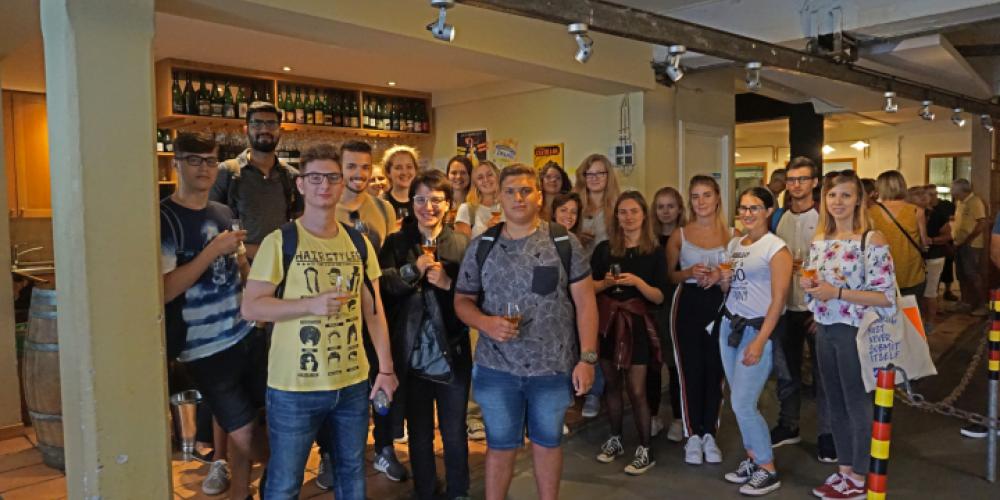
Course focus
The summer school prides itself on presenting the students with a multidisciplinary and international research environment in molecular biology and biotechnology. The lectures are combined with workshops in state-of-the-art laboratories which are used by the VUB’s ‘Structural Biology Brussels’, ‘Microbiology’, and ‘Cellular and Molecular Immunology’ research groups. The students really get to see and work with the best of the best.
Every day of the week the programme focused on a different theme – microorganisms, proteins, immunology and plants. The course provides an overview with two classes of proteins as the common thread: fluorescent proteins and nanobodies. Interspersed there is time for the participants to discover Brussels, and a visit to a brewery is also part of the programme. At the end of the week, participants are asked to make a short presentation on what they’ve learned, after which certificates are handed out during a small reception.
A special experience
The 20 students this year came from 12 different countries: United Kingdom, Russia, Croatia, France, Austria, Italy, Czech Republic, Ireland, Greece, the Netherlands, Turkey and Switzerland. The one-week summer school is a special experience, as classes take place in Brussels, the heart of Europe, so by default a very international city. And the VUB is a university much like its host-city: very internationally-oriented.
As Professor Eveline Peeters, the programme coordinator of the summer school, explains, “This is an intense learning experience with a mix of classes and hands-on workshops. The added value lies – among other things – in how closely guided the students are in the laboratories by the researchers and professors themselves. In addition to that, the social activities organised throughout the week also allow immediate access to the researchers, so the students have the opportunity to ask questions and get more information about the course, its topics and life at VUB and in Brussels.” [continue reading below pictures]
A taster for what’s to come
Most of the attending students are still in their bachelor’s programme, so it is aimed at giving them a taster of what is to come if they were to carry on doing a master’s degree on a biotechnology-related programme. They obtain 3 ECTS at the end of the week’s summer school. The aim is that the students become aware of biotech research at VUB and in Belgium. They should get theoretical and application-oriented insights into the different biotech topics in applied immunology, microbiology, molecular biology, and protein structure and function. They should be able to manage basic practical skills, and on the last day of the summer school they make a very short presentation on what their take-home message will be: what they’ve learnt from the past week.
So, how do the professors involved in the summer school experience this week? The course is relatively easy to set up as all the work is done throughout the academic year, and things are much quieter in summer. It helps to raise awareness in terms of the department’s research but also for their master in molecular biology programme which is English-taught.
“It’s a pleasure to teach these summer school students, as they are highly motivated. Remember that they are here during their holidays, so their investment is high. It makes for a rewarding experience for us as academic staff as well.”, explains Prof Jo Van Ginderachter, head of the department’s Cellular and Molecular Immunology group. He adds, “Meeting these students is very enriching, and ultimately, in time, it also helps us to expand our network of contacts. Personally, I enjoy teaching at the summer school, as it’s a chance for me to get back into the labs and show the students how to do the experiments. Nowadays I don’t get the time to do this during the academic year, so it allows me to ‘get my hands dirty’ again so to speak.”
There are some vague ideas to expand the summer school from one to two weeks. Based on some initial feedback from participating students, it would be a good idea, as it would give them the opportunity to have more lectures and tackle more information.
“Expanding the summer school to two weeks would definitely be an option. We need to look at this more carefully. It would give us the opportunity to expand on some topics, offer extended workshops and allow more time for the students to really get to grips with some of the material,” explains Professor Peeters. “The cooperation with the VUB International Relations office, the faculty and those within the department is excellent, so we will look at how to proceed in the future, indeed.” [continue reading below pictures]
And what do the students think?
Students have indicated in some initial feedback that they would recommend putting this summer school over two weeks, rather than fitting it all into one. The only catch would be the financial side, as doubling the costs might become a barrier for some students, so this needs to be kept in mind.
The summer school has received very positive feedback from the students. Below some quotes taken from the feedback form:
“Everything was precisely prepared, and we had a chance to learn and experience a lot. However, I would prefer to have more lectures”
“Very motivated lectures, interesting topics”, “a great experience”, “Thank you for giving me a chance to experience something like this”
“The labs were really good and organised”, “should last longer!”
Let’s see what 2020 will bring. Another biotech summer school definitely, but let’s see if the set-up stays as is, or is expanded!